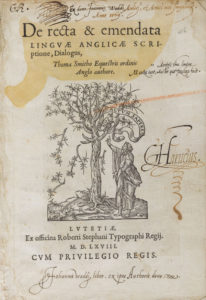 Sir Thomas Smith (1513-77), De recta & emendata linguæ Anglicæ scriptione, dialogus (Paris: Robert Estienne, 1568). [2], 44 leaves; 23 cm. (4to). Princeton University Library, Department of Rare Books and Special Collections, South East (RB) (Ex) PE1137.A2 S53 1568.
Sir Thomas Smith (1513-77), De recta & emendata linguæ Anglicæ scriptione, dialogus (Paris: Robert Estienne, 1568). [2], 44 leaves; 23 cm. (4to). Princeton University Library, Department of Rare Books and Special Collections, South East (RB) (Ex) PE1137.A2 S53 1568.
A fellow son of Saffron Walden and known for his own precocity at Cambridge, Smith was an elder patron to the much younger Harvey just as he had begun to flourish intellectually upon his matriculation to Christ’s College, Cambridge in 1566. Sir Thomas appears to have provided considerable guidance in personal and epistolary exchanges, and it was probably as Harvey contemplated Smith’s own life and career that the young scholar sought particular advice about the study of law (Smith was Regius Professor of Civil Law and made a study of the subject on a scholarly grand tour to France and northern Italy decades earlier). Smith also maintained a lifelong interest in language (much as Harvey did) and linguistics, making a name for himself through his advocacy of Erasmus’s reformed method for pronouncing ancient Greek during the early 1540s, and which also extended to the English language, culminating in the first Paris editions of his works on Greek and English, including the present De recta & emendata Linguae Anglicae scriptione (1568).
Adopting the form of a philosophical dialogue, Smith makes a forceful argument for the reform of the Latin-based alphabet in order to accommodate phonetic English, thereby promoting a native, vernacular English linguistic (and thus also literary) tradition. Harvey records this particular copy as an ex dono of 1569 from Smith’s nephew and secretary (“amici mei singularis”), John Wood, following its original presentation from the author himself to Wood (“ex ipso Auctoris dono”). Upon receipt, Harvey made of this a tertium quid, adding the further reflective and handsomely written note: “Most dear are the gifts that the giver makes precious.” See Sir Thomas Smith, Literary and Linguistic Works, ed. Bror Danielsson, Stockholm Studies in English, vols. 12, 50, 56. 3 vols. (Stockholm: Almqvist & Wiksell, 1963-83); E. J. Dobson, English Pronunciation, 1500-1700 (2 vols.; Oxford: Clarendon Press, 1968), 1:46-52; and Ian Archer, “Smith, Sir Thomas,” in Oxford Dictionary of National Biography, online edn, Jan 2008, http://www.oxforddnb.com.
― Earle Havens

